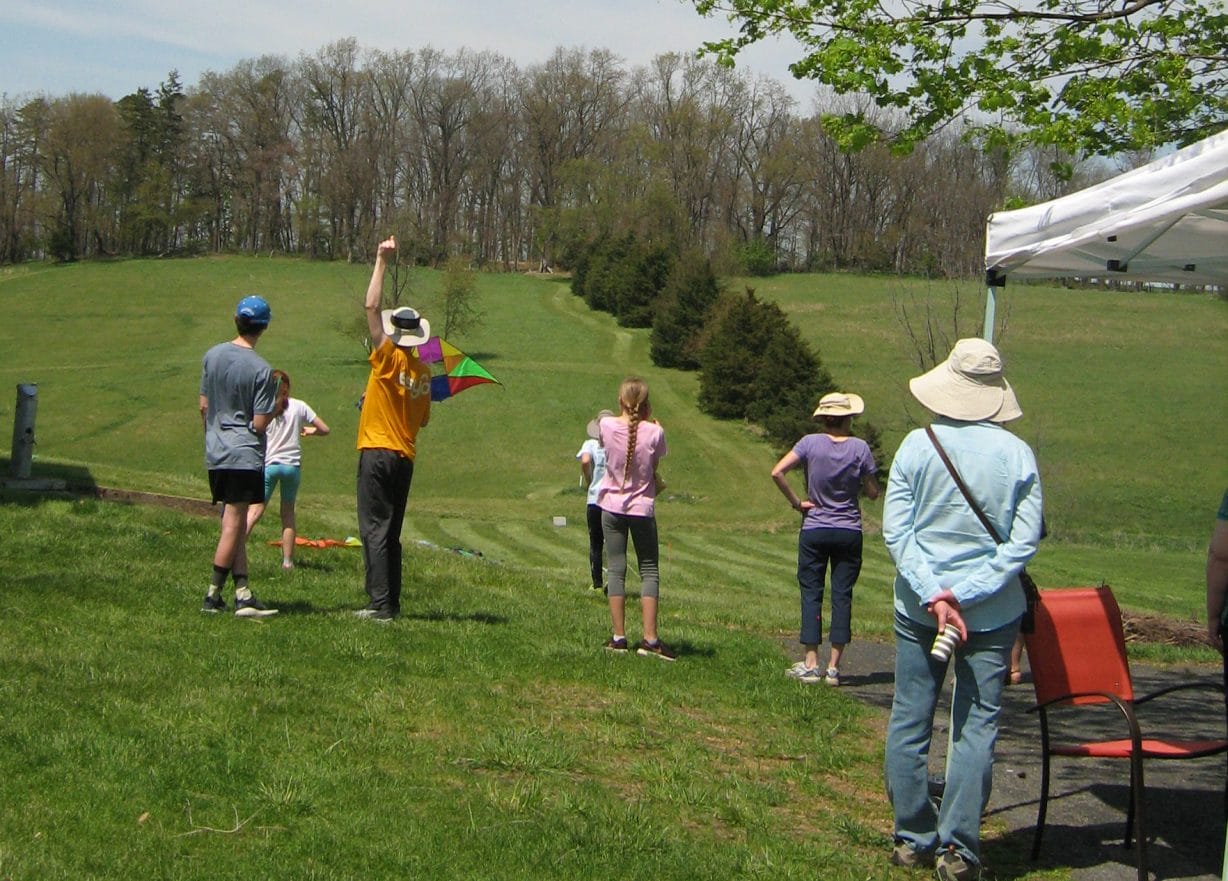
By Stephanie Spernak, contributor
On a warm, sunny Saturday, members of a Harrisonburg cohousing group hosted an open house to celebrate Earth Day at the future site of their community, Juniper Hill Commons, which could begin construction before the end of the year.
Some children built examples of earth art in the garage on the farmland that will be the community’s site. Others maneuvered colorful kites on the 5.5 acres of gently sloping green space behind the white farmhouse at 630 Keezletown Road not far from the Spotswood Shopping Center off East Market Street.
Juniper Hill member Ben Frantz Kaspar explained how the design of the entire community is intended to encourage neighbors to connect with one another, while simultaneously helping them protect the environment.
He said cohousing developments optimize land use by congregating the homes. This design allows for a much larger area of green space than is typically found in a suburban development where each homeowner has an individual yard, he said.
When members “pool” their individual green space into a much larger common space, they can share it and use it for projects, such as gardens, orchards and walking paths, Kaspar said.
And by creating larger spaces that can have multiple uses, he said, “pooling together is more than the sum of the parts.”
The Earth Day Open House is part of an annual week-long Earth Day celebration — the official Earth Day is April 22 — sponsored by the Cohousing Association of the United States. The event aims to highlight the concept of cohousing and the importance of sustainable living and protection of the environment.
According to the Cohousing Association’s website, many of the more than 150 communities across the country will “open their doors to neighbors, friends and community seekers” for virtual or in-person visits to learn more about the “sustainable and connected way of life” and “benefits of living” in cohousing.
The Juniper Hill development received approval from the Harrisonburg City Council in March 2020. Community members expect to break ground on the development by late 2022, if they get commitments for most of the 27 multi-unit homes that are planned as part of the development.
The cohousing group purchased the land for the cohousing site in 2018. The farmhouse at the site will be preserved but moved to another location on the lot.
Juniper Hill member Ervin Stutzman, the building project lead, said he and other members looked at several locations over the eight years the group was planning the community. He said it was hard to find a suitable site in terms of size and other desirable attributes the group wanted for their future community.
Now retired, Stutzman was the executive director for Mennonite Church USA and served as the professor of church ministries and dean at Eastern Mennonite Seminary in Harrisonburg.
Another Juniper Hill member, Fran Park, is leaving a 55+ retirement community in Connecticut to move to Harrisonburg to live in the planned community. Park said she had been interested in cohousing for many years and decided on JHC because her sister lives just an hour away. Another important reason, she said, was the ability to install solar panels on her new home, something she was not permitted to do in her current community.
Park described a cohousing value that she shared as: “walking more gently on the Earth…use what you need and not a whole lot more.”
Sue and Guy Freeson have been Juniper Hill members from the start of the Harrisonburg Cohousing group.
They lived on a farm in Staunton that they recently sold and have moved to a home near the Juniper Hill site. They plan to move into their Juniper Hill home when it’s ready. Those homes will be built one at a time, as the group needs the income from each sale to keep building, Stutzman said.
Sue Freeson said she and her husband had planned to start a cohousing community on acreage at their farm, but not enough interested people could contribute to the necessary start-up financing.
Cohousing members are not just focused on their specific community but also supporting the entire city, Freeson said. As an example, she said Juniper Hill members participated in the April 9 clean-up day at Blacks Run.
Being able to share tasks and resources, such as equipment, is another benefit to Juniper Hill members and to the Earth, Freeson said.
“Not everyone in the community,” she said, “needs their own lawn mower.”
Journalism is changing, and that’s why The Citizen is here. We’re independent. We’re local. We pay our contributors, and the money you give goes directly to the reporting. No overhead. No printing costs. Just facts, stories and context. We’re also a proud member of the Virginia Press Association. Thanks for your support.
